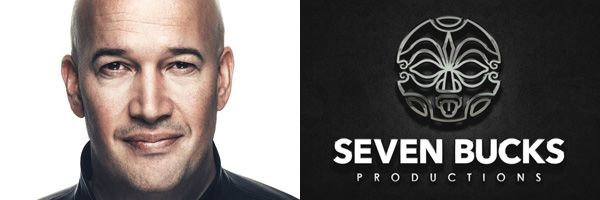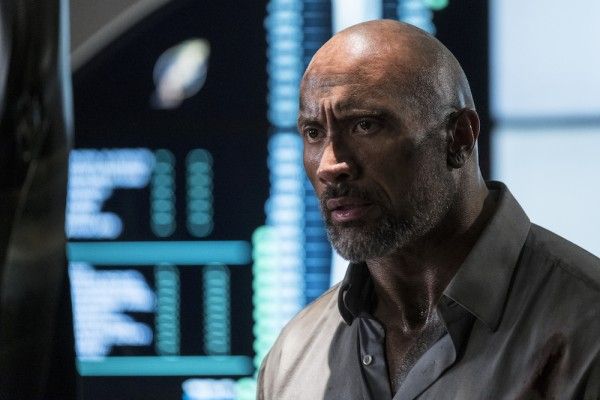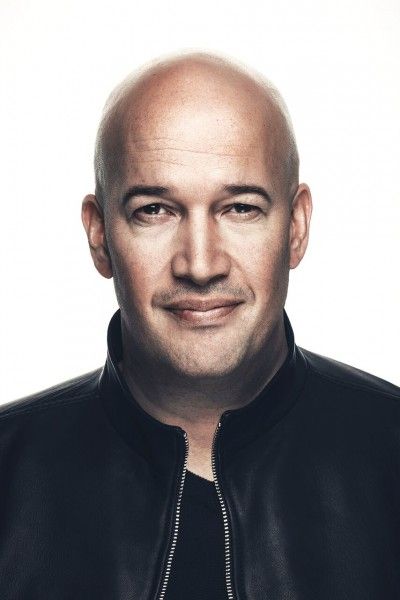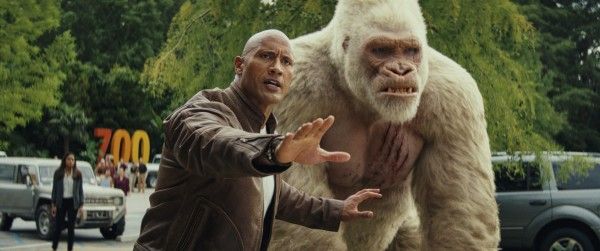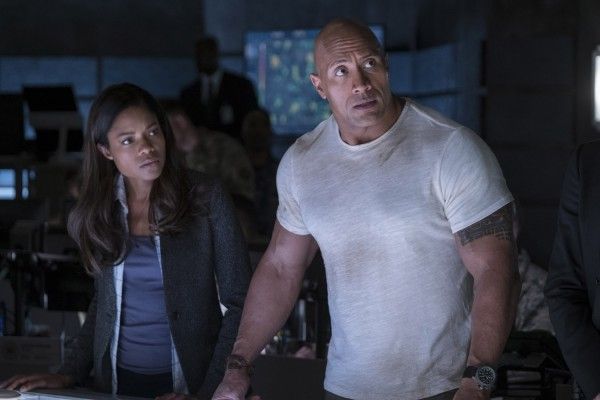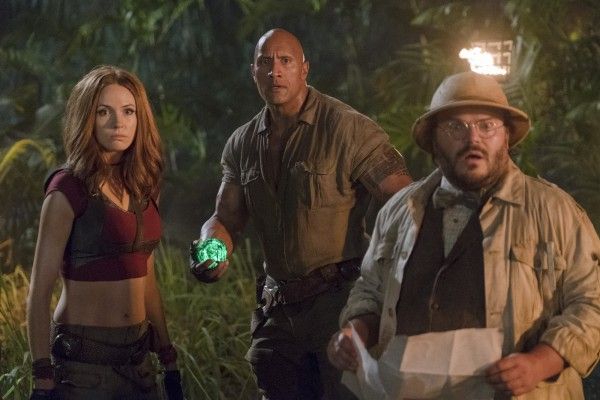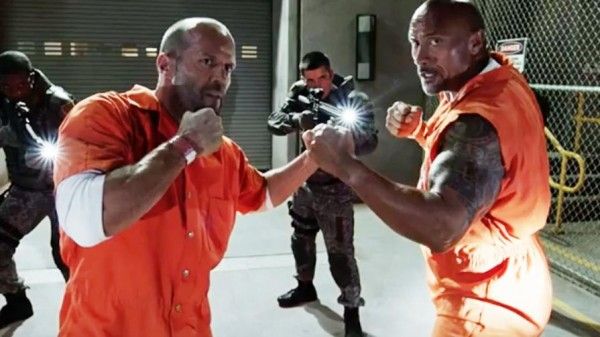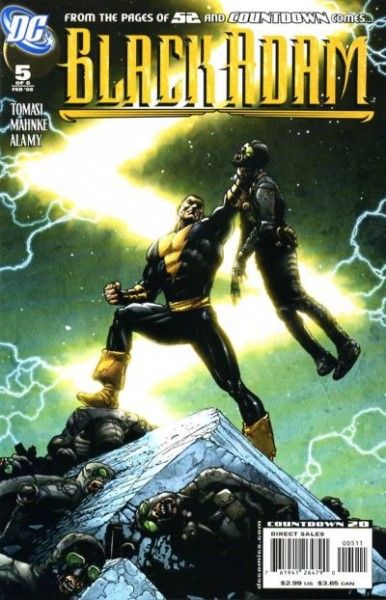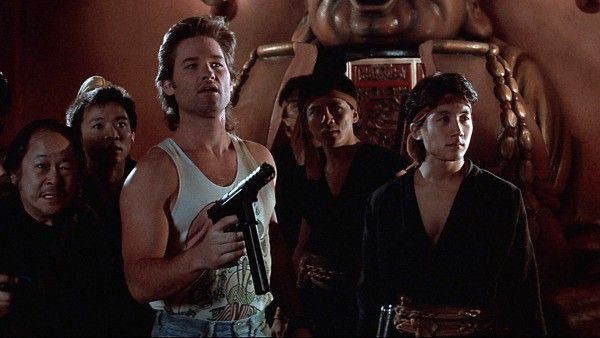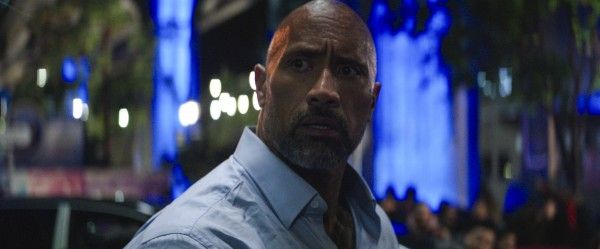Dwayne Johnson is one of the biggest movie stars in the world, but he doesn’t do it alone. In 2012, fresh off the success of Fast Five, Johnson co-founded his own production company with Dany Garcia called Seven Bucks Productions. Johnson and Garcia both serve as co-founders and co-CEOs of the company, but when it comes to actually running the development and production of the specific film and TV projects that get made, Hiram Garcia is the man with the plan.
Hiram Garcia has known Johnson since he was a teenager, and began collaborating creatively with the actor when creating the character of “The Rock.” When Garcia was invited to come onboard The Scorpion King to help out with Johnson’s titular character, he knew immediately what he wanted to do with the rest of his life: he wanted to make movies.
Garcia then began the process of doing the work—attending classes, working on productions, and learning everything he possibly could about the art and business of filmmaking. And after collaborating with Johnson for years, in 2017 Hiram Garcia was promoted to President of Production at Seven Bucks Productions, tasked with running the various projects on a day-to-day basis. Since that time, Garcia has helped shepherd hits like Jumanji: Welcome to the Jungle, Rampage, Skyscraper, and upcoming projects like Disney’s Jungle Cruise.
So when I was offered the chance to speak with Garcia—one of the key people in charge of getting some of the biggest movies around made—for an extended, exclusive interview, I jumped at the opportunity. Minutes into our conversation, it became clear that Garcia is not only a massive fan of film and filmmaking, but a very smart study of the moviemaking business as well.
Throughout the course of our wide-ranging discussion, Garcia talked a bit about his background and how found himself in the role of president of production, the guiding philosophy of Seven Bucks Productions films and how that led to one big creative disagreement on Rampage, his close collaboration and friendship with Johnson, and how the smash box office hit Jumanji: Welcome to the Jungle came together.
We also discussed a few of Seven Bucks Productions’ most high-profile upcoming projects, including what fans can expect from Jumanji 3 (including a potentially new environment), how Hobbs and Shaw will have a Lethal Weapon-like vibe and why David Leitch was the perfect director for the project, why Big Trouble in Little China won’t be a remake, what’s going on with Johnson’s DC Films debut Black Adam, and much more.
If you’re at all interested in how movies get made, I can assure you Garcia has a lot of fascinating stuff to say in this interview. Moreover, Garcia is clearly a passionate fan of film and storytelling, and candidly discusses how he goes about toeing the line between creative expression and the realities of the moviemaking business. I could have peppered him with questions for hours more, but in the time available we covered a lot of interesting ground. Check out the full interview below.
So how did you come to find yourself involved with Seven Bucks Productions, and what was the path to your current role as president of production like?
HIRAM GARCIA: Obviously I've known Dwayne [Johnson] for a very long time, since I was 13. I was originally a music major in college, and when I graduated I looked at the music business, and it just didn't seem like a good fit for me after I interned a little bit, and I was kind of lost in between, and I always helped Dwayne out creatively with stuff, for the character of "The Rock." We have very similar sensibilities and a similar sense of humor; we used to have fun with it. And when he got Scorpion King, he knew I was kind of lost career-wise, I really wasn't sure what I wanted to do, but he knew I was a creative guy and he said, "Hey, why don't you come do Scorpion King with me? Let's try it out." And the moment I got on set I was like, well, that's what I want to do. I want to be a producer.
And I kind of refocused my life from that point and went and took some scriptwriting classes, and I started working as a P.A. in commercials in South Florida, and I even did a little bit of second assistant directing and so forth and kind of really wanted to climb my way up from the bottom, learn the ropes. I always kind of knew that as a producer you're attached to everything on set, so it was important to me to get a sense of what everyone does.
After kind of putting in this time, I just came around where I circled back with Dwayne as well as Dany, the co-owner of Seven Bucks. She had started managing him, and me and Dwayne started working together again and that was actually, that summer, quite apropos for what we're about to do—it was the summer that he and myself and Chris Morgan created the Hobbs character for Fast and Furious 5.
Oh that's cool.
GARCIA: We had the invite to do Fast 5 and we had an amazing summer kind of just laughing and creating this larger than life character who had ridiculous and fun one-liners and kicked ass, the whole deal. And from there, we just had this synergy that started going with Dany and Dwayne and myself, and we all had ambitions to start this company. Similar to Dany and Dwayne, who are always the hardest workers in the room, I like to try and keep up with them. I just kind of kept my head down and did as much as I could to listen, learn from all the great producers we worked with, watch as many movies as I could, just always pay attention, and always try and keep a macro perspective on the business and work on relationship development, constantly keep ideas coming, creating concepts that would work for us. And as our company started to grow and we were looking to fill a lead position, it worked out that I ended up being a good candidate for it.
I was honored to be selected for it, but I think we had all kind of grown this company together and felt such a connection to it that it was a natural fit, and I’ve got to tell you, when they were kind enough to select me, I was so proud and so honored to kind of run with it now, because Seven Bucks has basically been my life and breath every day. It's funny. Dwayne and I were just having this conversation, and we both looked at each other and we were like, "You know we're crazy, because we don't stop." Like, we just don't stop working.
The question we're always presented with is, "Hey, how do you guys do it?" And sometimes it's a funny question because we're like, "I don't know, I think we just keep trying." Because we're so fortunate, but we all had that similar hunger where we just want to do great things, and we want to entertain on the biggest scale and leave a positive imprint on our audiences and with our material. So I was very fortunate, it was a great fit, and here we are now and I get to talk to Collider, so it must be a good path, right?
(Laughs) Right. It's insane to me when I always remember like, "Oh, yeah, in addition to all the massive movies Dwayne's doing he's a regular on an HBO series." Like that in and of itself is a full-time job for any other actor.
GARCIA: (Laughs) Yeah, yeah. Sometimes I think people don't even realize it. My favorite question is always when one of our partners is like, "Oh, so what are you guys next?" And then it's like a can of worms, where we're like, "Well, we're doing this, and then that overlaps with this, and then it overlaps with this," and so we always kind of just knock on wood after that, and we're like, "Man, we're fortunate." And it's good when things are going well and we're just trying to work as hard as we can and take advantage during that time.
What does your day-to-day role as president of production look like? How do you kind of approach the slate and handle the decision-making process of what’s coming down the pike?
GARCIA: It's a great question because it's always two-fold, whereas I think sometimes you'll get maybe a typical president of production who will kind of be back at a homebase, kind of working from there, but in addition I'm always usually one of the producers on our movies as well. So for me—depending on when it is during the year—typically my day will start with the movie we're working on or the production we're on and just kind of making sure that we're on track for that day, everything's going well, everything's in line and we're off and running.
And then, one of the things that occurs when you work in this business is it is a business of having a ton of boulders. Like, you have a thousand boulders and you're trying to get each one over the hill, because it is incredibly hard to get things made in our industry. It's a long process. The average development process of a film is about five years. So every day, once you know the movie’s off and everything is good, you start on the first boulder and want to push it as much as you can that day and do the best as you can to get it closer to the top of the hill, and then you move on to the next one, and the next one, and then you try to give each project a little bit of love and it comes in all different forms, whether it be reading the latest draft, turning notes around, trying to find a writer for a particular project that you have, connecting with the studio executives that you are dealing with on it, trying to make sure that their notes are being addressed. It's all those things that come while you're moving these boulders up the hill.
And then, you know, much like we're dealing with this year, it's like the perfect storm where you're filming a movie, you're developing your next project, and then you have a movie releasing as well, so at the same time you are doing your best to make sure the marketing campaign is going as you like, and as you're listening to feedback, are there any adjustments you want to make? And where should we be traveling to, where do we want to promote this project? It's just a lot of juggling and balancing and doing your best to keep everything moving, because again, it is a very slow train line of projects, but you want to kind of keep them all moving. So when one finishes, hopefully there's one behind it ready to come to the crest of that hill and kind of go over and make that ride.
And then at the same time, you're looking for new content. You're digging, you're reading, you're making friends and connections and just cooking up crazy ideas, looking for inspiration in every corner. With great pride, I am a nerd within, so whether it be like graphic novels and comics and video games, you know, I'm always surfing the internet. Whatever it is, you're just always looking for inspiration, because you never know where that next idea is going to come from. There's never been a greater time in our business for the creation of content, and that's something that is easy to sometimes lose track of when you are pushing all these boulders, and we always like to make a point to continue to look for new content, new projects, new things that are relevant and that are fun to kind of bring to our audiences.
With Seven Bucks Productions, is there kind of a central motto or a specific kind of film you guys are looking for that you guys kind of try to stick true to?
GARCIA: Yeah, we have this motto that we always say, "It's about audience first," right? So we really like to focus on things that we think audiences want to see, because we try and specialize in projects that need to be seen in a theater. I think more than ever, there are a million ways to consume content, whether it be on your phones and iPads and TV and Netflix and so on, but we want to make projects that need to be seen in a theater, because going to the movies isn't the cheapest process, and we're respectful of people's hard-earned money and what they want to spend on, so we try to always focus on movies that have spectacle and truly maximize and fully utilize the benefit of going to a large theater. So we look for that.
We love heart. We always try and find some thread of heart to anchor our stories, whether you're looking at like Skyscraper and a father trying to get back to his family, or Rampage, you know the relationship that DJ had with George. It's just something that resonates with our belief in family values and heart, and that can anchor the story. That's very important for us.
We also always like to make sure that audiences leave happy. In the earliest versions of Rampage when we first got it, there were attempts to kill George, the gorilla. And we're like, "There's no way we can kill George and leave audiences happy," you know? He is such a beloved character, and his and Dwayne's relationship was so special. We love to leave the audience happy, because ultimately, we know going to the movies is a form of escapism and ultimately, you kind of like to leave that movie feeling good and having had a good time and feeling a little bit better than when you went in there.
That's something I wanted to ask you about too, because I thought that that was really interesting when Dwayne kind of said candidly that he fought very hard to have George live. Have there been other projects you guys have worked on that you guys have kind re-jiggered to bring it more in line with your overall philosophy?
GARCIA: Rampage was the one that sticks out the most. One, with us being huge animal lovers—I mean, you're not going to find a team that loves animals more than Seven Bucks. We probably have like 15 dogs among us all, but I think that's the one that stands out the most where we were like right away, flags went up, we're like, "There's no way that George can die at the end of this." And that kind of is where we got to this point where we were able to have fun with the ending, because we know that there actually was an expectation—for some reason, those kinds of movies usually end with the animal or the special creature dying. So it kind of felt natural to put that in, and I think audiences naturally believed it and it was very fun to bring it back and let them see we were just playing.
But no, I can't think of another movie, really, where there was just a discrepancy initially with the finale of the movie or something like that. But Rampage, for sure, was one where a lot of big feet, you know, me and Dwayne both have size 15 feet, so we slammed both of those things down. And we were like, "No way. Can't happen."
Jumanji was just this insane, massive hit. I know you’re developing the sequel now, but I was curious if you could talk a little bit about how that project came together and what fans can expect from the sequel and how it might differ from the first one.
GARCIA: Our agent had kind of flagged Jumanji for us. He was like, "Hey, I have this script. It's Jumanji. I think you should check it out. It feels like this is right up our alley." It was a testament, especially to Dwayne, who's the busiest guy in the world, but something about that night—I feel like we were maybe at a Wrestle Mania or something like that. I'm horrible with references in time, but I believe we were at an event like that. We had just landed. Brad told us about it. He sent us a script. Dwayne read it that night. I read it that night, and it was just there. Right away on first reading, you just kind of got it. The concept was so clean. It was so charming. There was so much heart in it, like what you and I were just speaking about, that it was a quick decision. You know, in our business we get a lot of big projects, but a lot of them need a lot of work. It's just part of the process, and Jumanji was such a clean concept and the script was already so far along and it was genuinely funny and charming and sweet, while honoring the original. We're huge fans of the original, and right away, when we heard the name Jumanji we were like, "Oh, man. That's sacred territory." We're big fans of it and want to make sure we can pay homage to the original, and when we read it, we saw that they had done it well. We were even able to add more aspects to make sure we really honored the original one Robin [Williams] had done.
The movie just came together so fluidly after that. It was an unbelievable cast, and as you can imagine, it's so many big stars. And they all get along so well. It was one of the friendliest, kindest sets I've ever been on. I think that ties with Jungle Cruise right now that I'm on where it is just the most friendly, fun set—except Jumanji between Kevin Hart and DJ, there's so much raunchy humor, because those guys have great senses of humor. But it just was a smooth, fun process. And as we made the movie, I remember—so naturally whenever you see that director's cut, it's usually a great moment where you kind of get an idea, "Okay, this is how much work we have to do now." You know, do we need additional photography? What do we have to fix? What isn't working? I’ve got to tell you, that movie, the first cut I saw, and I'm talking early, raw cut, no effects in it, it worked and it was fun, and that was without any of the effects. You're looking at puppets and animation in place of all the CGI and so forth. It was so fun, and you knew right away that we had something special.
As we tested the movie, it tested great, we got great feedback, we were able to improve it a little bit more and then you know when you're opening against Star Wars, we always knew we weren't going to beat Star Wars. You just hope they leave some left behind for you, but at that time, audiences really responded to just like a big four quadrant, edgy, fun, family movie, and it was beyond our dreams. We knew we had a good movie. You always hope that audiences receive it well, and we're so lucky they did. Then it just kind of took on a life of its own and it was so rewarding to see the way people responded to it, because we're extremely proud of that movie.
What we have planned for the second one is even better. We were very sensitive to wanting to make sure that we were making a movie that felt like it should be made, that it wasn't just a sequel for the sake of a sequel. We cracked a really great story for it, continuing the journey of our characters. I can't give much away, but I can tell you, it's so much fun. We had a blast pitching it to Sony. When we pitched it to Sony, they were laughing like crazy during the pitch, and they were like, "Guys, please go make this. We love it. We're a hundred percent behind it." And so we're expecting our first draft soon, and we are full throttle ahead on making this, and everyone's very excited to jump back in and kind of continue the story.
Is there an idea for the sequel to have a different aesthetic? Is it going to a different location, or is it going to go back to the jungle?
GARCIA: No, we're exploring kind of changing things up a little bit. There may be some jungle, but there may not be. That's one of those things we're playing with. The place that we like to play in is when we initially went into this, we wanted to expand on the mythology of the game and what it meant to be a part of the game, and ultimately with the concept of the game just wants to be played. That's the beauty of the Jumanji game, is it just wants to be played and it's going to find a way to be played. It will continue to evolve. It will continue to make sure it's accessible. And so we did that universe of knowing the version that Robin Williams experienced, then the version that our guys experienced. We're just going to continue to uphold that mythology and expand it more and really open up that Jumanji universe.
I also have to ask you about Hobbs and Shaw. I know this one's been in development for a long time. What made David Leitch the right director? How is this going to differ from other Fast and Furious films?
GARCIA: Oh, man. Well, look, David Leitch, he is a phenomenal director, a phenomenal mind, just as a storyteller. It’s funny, one of the things that you automatically expect with David is unbelievable spectacle, special effects, stunts. He comes from the stunt world and he's a great second unit director. He's done so much great action, but his acumen as a storyteller and his ability to kind of dig into characters and craft these great narratives and these great journeys is so impressive, and we had so much fun just watching him kind of dig into this Hobbs and Shaw journey, and just bring so many great elements of digging into both the Hobbs character and the Shaw character, while also just having a natural instinct for comedy.
The banter between these two guys is going to be so fun. These two guys that just want to kick each other's asses so bad the whole time, but you know, duty calls. It's a lot of fun. When I told you that we kind of created that Hobbs character for Fast Five, there was always this goal of if we do this right and audiences respond to Hobbs, like we're very fortunate that they did, we think that there's an opportunity to spin this character off. And after the several movies that we did, it felt like the time was right after Fate of the Furious, and people really responded to Dwayne and Jason’s chemistry on screen and the fun that we started to find with them.
So I think what you'll find in this movie that's a little bit different is obviously there's going to be elements that you're used to seeing in the Fast and Furious world, but we're starting to slide it. We're definitely carving our own path. You’re going to feel the connection of the universes, but you're still going to definitely feel that this a movie that stands on its own, that's kind of forming its own unique path. And the chemistry of Dwayne and Jason together and what we're planning for them to do, I think audiences are going to go crazy, because not only does the movie have all the elements that you typically would love from the Fast and Furious movies, like the set pieces and the action and intensity, but man, the comedy and banter of these two guys, those elements that people love from Lethal Weapon and Tango and Cash of just two guys that just get on each other's nerves the whole time while they're trying to save the world. It's a lot of fun.
And so that's prepping right now, and actually once we wrap Jungle Cruise, we'll go right into Hobbs and Shaw, which will be shooting in London. So we're really excited about it. The studio's very excited about it, and I'm telling you, when you get to see what Leitch has planned for this movie and some of the crazy iconic wonders that he's known for, people are going to lose their mind.
You mentioned Lethal Weapon and Tango and Cash, is the idea then to kind of have kind of that classic buddy cop vibe there?
GARCIA: Oh yes, for sure. Look, Hobbs and Shaw, they're guys that you kind of started to feel it in Fate of the Furious, like even though they were kind of getting along near the end, they ultimately just want to kick each other's asses, and they both feel that each one can win. So when you have that element constantly percolating between these two extreme outlets during this journey, it makes for explosive scenes and some great friction and comedy.
I know Shazam! was originally developed with Dwayne potentially playing Black Adam in that film. I was wondering if you could kind of talk about how that developed and how the idea came about to put Black Adam in his own film, and what's the status of Black Adam? Is that still happening?
GARCIA: Oh, yeah. Black Adam is definitely happening. We're actually very deep into a script on it right now, which is coming along really well. I'm really excited with the story we've crafted. Look, I've always been a huge comic book fan. I've always had this dream—you know, you kind of have like these goals of like, "One day I'd love to be able to do this and this," and making a superhero movie was definitely always one of my dreams. For the longest time, you know you have this kind of living superhero in Dwayne Johnson, so I was always trying to figure out what's the perfect character that will kind of fit him and his look and his build and his kind of edge and the attitude he's got.
And Black Adam just made great sense. It was this kind of really cool anti-hero who believes in basically exacting justice in his way with a fascinating backstory, you know, the history he has with regards to having been a former slave and freeing his people and then getting his abilities and what happened from there. So I pitched that to Dwayne early on, and he loved the idea, and we've just kind of kept it in the back of our mind. We had a great conversation with Warner Brothers one time years ago, and we all settled on this was our character. So as we were developing an actual Black Adam and Shazam movie, we were just realizing that both characters are so special that we didn't want to compromise either of them by cramming them both into the same movie.
Yeah, yeah.
GARCIA: So that's why we made the decision to let Shazam have his own standalone movie and kind of launch him properly, and then we'll do the same for Black Adam. And so that kind of really freed things up. It allowed us to develop the right version of both, and so where we are now with Black Adam is we just got our latest script [from Adam Sztykiel]. We're doing some revisions on it. We're extremely excited about it, the studio's very excited about it. And I'm telling you man, as a comic book fan, when this thing comes out, it is going to be amazing. This is the fanboy in me talking to you, it's going to deliver on the goods of everything you'd want to see Black Adam do, he's going to be doing in this film.
I mean, Dwayne Johnson as a superhero just sounds like a print money idea.
GARCIA: Exactly. Especially when he's not a boy scout. Especially when he's got edge to him. Like, he's not the boy scout superhero, he's the guy that like, okay, you cross him? Well, I rip your head off, and then I move on to the next guy.
Big Trouble in Little China is one of my favorite movies, and I love that Dwayne's obviously this very big physical presence, but he's not afraid to play with ideas of masculinity, and Jack Burton’s an interesting fit there. What's the status of that film? And have you guys talked about how it would differ from the original?
GARCIA: Yeah, so actually, it's funny, there are a lot of things going on with that. We are in the process of developing that, and let me tell you, the idea is not to actually remake Big Trouble in Little China. You can't remake a classic like that, so the idea is, what we're planning to do is we're going to continue the story. We're going to continue the universe of Big Trouble in Little China. Everything that happened in the original exists and is standalone and I think there's only one person that could ever play Jack Burton, so Dwayne would never try and play that character. So we are just having a lot of fun. We're actually in a really great space with the story that we've cracked, but yeah, no remake. It is a continuation, and we are deep into development in that as well, and I think you'll start hearing some things about that probably soon.
You talked a little bit earlier about making sure projects are right and everything and how it takes a while to get projects going, but I would also imagine when you have someone like Dwayne Johnson and you attach him to something, a studio is going to get really excited and want that to happen quickly. I was curious, as the president of production at Seven Bucks, how do you juggle that? How do you make sure that the movie is as good as it can be before it gets in front of cameras, and kind of your collaboration with Dwayne and getting scripts to the right place, with the pressure of everyone wanting to move quickly?
GARCIA: Yeah, absolutely. The great thing is that we're very hands on, and Dwayne is very hands on through the entire development process. You're very right, you attach Dwayne Johnson to a project and naturally the studios are going to get excited, and it starts to become a process of plotting the movie. Like when do we want to go? When do we want to date this movie? And look, there's some projects where it is a dance and a partnership with our studios that inevitably you can't help— there are some projects that are going to get dated that you're going to kind of back into a little bit. Like, this is the slot where it's got to go, and we're going to do our best and bust ass to make sure that the script is ready to go. And then there are some projects when you do have the ability to make sure everything is perfectly in line right before you kind of greenlight and go, but the fact is our business moves so fast and windows open and close so quickly and so frequently that sometimes you have to grab that slot, go for it, and say, "We're going to make it work by that date."
That’s the balance of the business, and we collectively kind of decide which are the projects that we're going to jump into that we're just going to make sure we bust our ass and do our best to get it ready in time, and which are the ones that we're going to say, "Hold on, guys. Let's not date this yet. Let's make sure that we get this a hundred percent right,” so that we feel good going in and everyone's confident and the script is as great as it can be. So it's a balance. You try your best to have a straight line kind of standard, but you know, the one thing you always learn about the entertainment industry is that it is just like moving targets all over the place, and you try and grab the one you can and you do the best you can. But a lot of times, you're backing into dates and dealing with timelines and budgets and giant studios. And we do our best to make everything work and create as good a project as we can.

